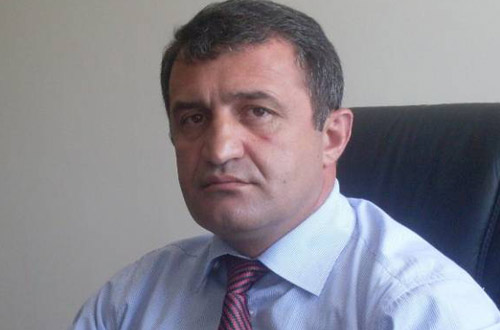| Newspaper: Moscow Picks New Leader for S.Ossetia |
| Civil Georgia, Tbilisi / 18 Aug.'11 / 13:27 |

Anatoly Bibilov has been named by the Russian daily, Kommersant, as a likely new leader of the breakaway region after November 13 elections. Photo: Cominf.org.
Moscow’s pick for next leader of South Ossetia is the breakaway region’s minister of emergency situations Anatoly Bibilov, the Russian daily, Kommersant, reported on August 18.
The breakaway region’s parliament on Wednesday approved November 13 as the date of the presidential election, which will be held simultaneously with a referendum on making Russian, together with Ossetian, the official language of the region.
Citing an unnamed source familiar with the process of “selecting a candidate” for the post of South Ossetian leader, the Kommersant reported that the process was led by an inter-agency group consisting of officials from the Russian President’s administration, Federal Security Service, Foreign Intelligence Service, Ministry of Defense, Foreign Ministry, Ministry of Regional Development (which is also in charge of reconstruction works in South Ossetia) and administration of the Russian government.
“Apart of Bibilov, deputy speaker of the parliament and leader of the ruling party Unity, Zurab Kokoev, and the republic’s ambassador to Moscow Dmitry Medoev were shortlisted. The Ministry of Regional Development and special services have insisted on the candidacy of minister of emergency situations [Anatoly Bibilov]… The candidacy, according to the source, is now undergoing approval process at the level of President Medvedev and Prime Minister Putin,” the Kommersant reported.
Born in Tskhinvali Anatoly Bibilov, 41, graduated Russia’s Ryazan High Command Airborne School in 1992. In 1994-1996 he was commander of the breakaway region’s MoD special task force. Before starting service in the Russian peacekeeping battalion in S.Ossetia in 1998, Bibilov lived and worked in Kiev for two years as a commercial director of unspecified enterprise, according to his official biography.
Before the August, 2008 war he was deputy commander of North Ossetian peacekeeping battalion in the conflict zone and in November, 2008 he was appointed as the minister of emergency situations of the breakaway region.
Citing the same source, the Kommersant also reported that couple of years ago Moscow was ready to back any nomination put forth by the incumbent leader Eduard Kokoity; but because of misuse of aid funds allocated by Russia to Tskhinvali following the 2008 war, Moscow “got disappointed” in Kokoity.
According to the Kommersant, Kokoity was willing to stay for the third term, but after Russia's Kremlin chief of staff Sergei Naryshkin rejected in May, 2009 any idea of changing law to allow Kokoity to run for the third term the latter started promoting among the Kremlin officials some of his closest allies as potential next leaders of the region; but the attempt failed, especially after one of his closest allies among the Russian officials, deputy chief of the FSB Vyacheslav Ushakov, was sacked in February, 2011.
The Kommersant also reported that the future career of Eduard Kokoity “is not yet defined”. Citing unnamed Russian official, the newspaper reported that Moscow will not “abandon” Kokoity and would offer him to take an official post in one of Russia’s regions, but not in North Caucasus in order to keep him far from South Ossetia and not to allow him “to influence on new leadership” in the region.
